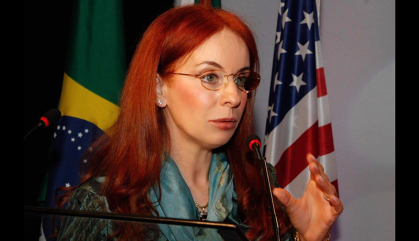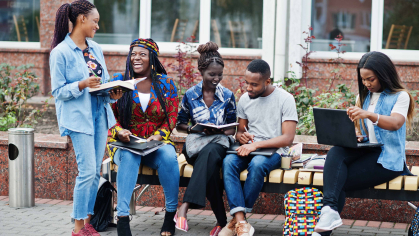Rutgers University Awards the Fulbright Chair in Global Health to Brazilian Pulmonologist

Rutgers University awarded the Fulbright Chair in Global Health — cosponsored by Rutgers Global and Rutgers Robert Wood Johnson Medical School (RWJMS) — to Mara Rúbia André Alves de Lima, a pulmonologist at the Federal University of Health Sciences of Porto Alegre (UFCSPA) in Brazil.
The chair — who will be at the helm for one semester and who also serves as regional director for South America at the Welcome Clubs International, an organization in special consultative status with the United Nations Economic and Social Council since 2020 — will continue focusing on patients with chronic cough from conditions including TB, COPD, asthma and bronchiectasis.
She spent the fall 2021 semester at Rutgers teaching and doing scholarly activities, such as participating in the Rutgers Connection Network (RCN) Mentoring Program, a faculty-mentoring program designed to create a culture of inclusion at Rutgers and increase academic engagement through collaborative partnerships with other faculty beyond the departmental level. de Lima also submitted an abstract which has been accepted for the 2022 Consortium of Universities on Global Health Conference titled, “An Educational Project to Bridge American and Brazilian Students in the Fight Against Misinformation on Two Global Killer Diseases, the New COVID-19 and the Ancient Neglected Tuberculosis.”
At Rutgers, de Lima says she is pursuing her passion for teaching global health, medical interviewing and physical examination by leading a pulmonology course at RWJMS and sharing personal experiences.
“I am always looking to increase my comprehensive vision of health on our planet, make sustainable partnerships and think globally,” she said. “It has been a pleasure to share local professional experiences and projects in Brazil, as well as my Brazilian culture.”
During classes, meetings and discussions, de Lima talks about Brazilian traditions, dress and cuisine. She says she has also taken full advantage of her semester here to delve more deeply into American culture by visiting museums and theaters and learning more about the culture and history of Rutgers.
Karen Lin, assistant dean for global health at RWJMS, has been co-teaching with de Lima and working to organize scholarly activities, grand rounds and public lectures. Lin has also co-mentored students with de Lima and has helped implement global education projects in partnership with UFCSPA in Brazil.
“We are fortunate to have Dr. de Lima in residence at Rutgers this semester to share her expertise in the field with our students and faculty,” Lin said.
In addition to teaching and conducting research, de Lima has delivered public lectures during her semester at Rutgers, including on the Rondon Project, launched in 1967 in Brazil to encourage students attending higher education institutions to participate in the sustainable development of vulnerable communities, strengthen citizenship through social inclusion and reduce regional inequalities. The lecture covered the history of the community service project and discussed the impact of the United Nations 2030 agenda-aligned project on health, education, culture and human rights in regions or communities with reduced access to health care, infrastructure and human resources.
Rutgers has a long history of international connections and hosts more than 1,500 international faculty and scholars and their family members each year, representing nearly 100 countries. They are engaged in research and teaching activities in 150 departments, laboratories, centers, institutes and programs universitywide. For more information about Rutgers’ global initiatives and activities, visit global.rutgers.edu.


